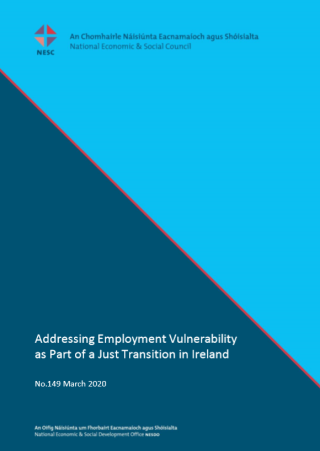NESC Report: Addressing Employment Vulnerability as part of a Just Transition in Ireland

In 2019, the Irish Government made a specific request to NESC in Future Jobs Ireland 2019 and the Climate Action Plan: to identify steps that could be taken to address the vulnerability arising for workers, firms and sectors in relation to the transition to a low-carbon and more digital and automated future. The Climate Action Plan also asked NESC to establish a Just Transition Review Group under its working group structures to advise the Climate Action Delivery Board. In its Report on Addressing Employment Vulnerability as Part of a Just Transition in Ireland, which looks at both questions simultaneously, NESC seeks to define a just transition in the context of vulnerable employment, modelling assumptions based on existing national and international research, before considering the key drivers that will support the delivery of decent work following transition.
The Report goes on to make a series of recommendations about how Ireland might make this Just Transition, summarised as follows:
Continuous, pre-emptive workforce development
- Increase Ireland’s ambition for workforce development with higher targets for employee training, appropriate resourcing of key bodies, and incentives for employers to help workers attend programmes.
- Enhance the skills and training advice available by providing it to workers before they may become unemployed, delivering more quality one-to-one coaching, counselling and mentoring, and making potential ‘destination’ a key consideration in the design of worker training programmes.
- Improve the information available on skills and training by making greater use of skills audits, better recognition of people’s informal skills, and with more information-sharing between the State, firms and workers.
- Increase the momentum behind efforts to increase participation in lifelong learning, especially by those who are under-represented in this activity.
Building resilient enterprises
- Extend appropriate enterprise supports to viable but vulnerable firms, convene inter-agency events and scenario planning, and consider supports for earlymover firms.
- Increase support to SMEs to allow them undertake development projects in areas that can build resilience, including support for local enterprise-led networks and a new Transition Voucher.
Delivering high-impact targeted funding to support transition
- Develop specific means of targeting financial support towards those most affected by the transition, to include social clauses and new firm- and community-based self-identification mechanisms.
- Improve supports for fund-application and local programme development via seed-funding and more place-based investment funds.
- Enhance engagement between government departments and agencies, and State and EU finance institutions such as the Strategic Banking Corporation of Ireland (SBCI), Microfinance Ireland (MFI) and the European Investment Bank (EIB) to assist firms.
Making it happen
10. Government, through the inter-departmental Future Jobs Ireland process (or similar), should take forward the recommendations of this report to provide more proactive supports for workers, improve enterprise resilience and help target finance to support transition.
11. Enhance communications efforts related to the transitions with a new group with appropriate funding, and roll out a programme to concretise ‘the transition’ for firms.
12. Establish a social dialogue and deliberative process, called the Just Transition Review Group, to develop a shared vision and associated mission-oriented actions for an Irish just transition.